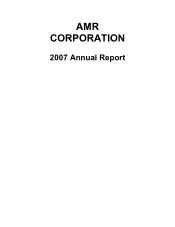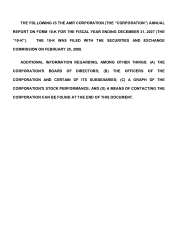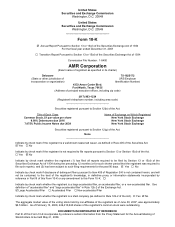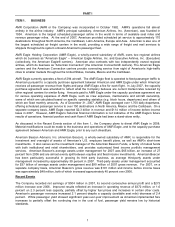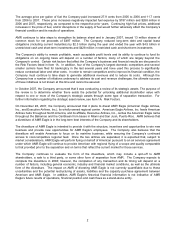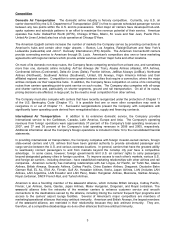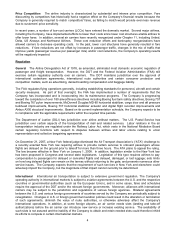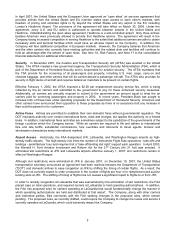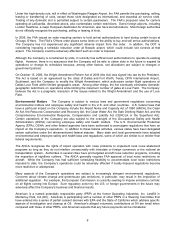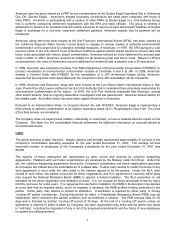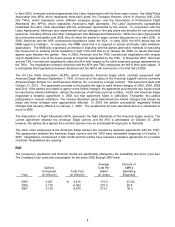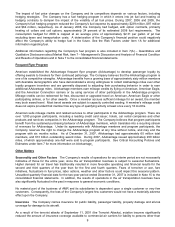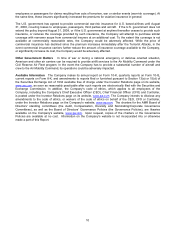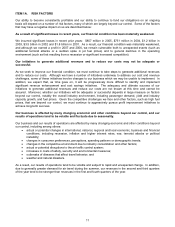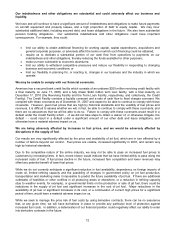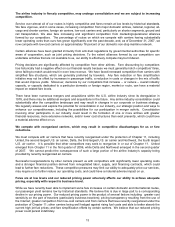American Airlines 2007 Annual Report Download - page 8
Download and view the complete annual report
Please find page 8 of the 2007 American Airlines annual report below. You can navigate through the pages in the report by either clicking on the pages listed below, or by using the keyword search tool below to find specific information within the annual report.5
In April 2007, the United States and the European Union approved an “open skies” air services agreement that
provides airlines from the United States and EU member states open access to each other’s markets, with
freedom of pricing and unlimited rights to fly beyond the United States and any airport in the EU including
London’s Heathrow Airport. The provisions of the agreement will take effect on March 30, 2008. Under the
agreement, every U.S. and EU airline is authorized to operate between airports in the United States and
Heathrow. Notwithstanding the open skies agreement, Heathrow is a slot-controlled airport. Only three airlines
besides American were previously allowed to provide that Heathrow service. The agreement will result in the
Company facing increased competition in serving Heathrow to the extent that additional carriers are able to obtain
necessary slots and terminal facilities which could have an adverse impact on the Company. In addition, the
Company will face additional competition in European markets. However, the Company believes that American
and the other carriers who currently have existing authorities and the related slots and facilities will continue to
hold an advantage after the advent of open skies. See Item 1A, Risk Factors, and Note 11 to the consolidated
financial statements for additional information.
Security In November 2001, the Aviation and Transportation Security Act (ATSA) was enacted in the United
States. The ATSA created a new government agency, the Transportation Security Administration (TSA), which is
part of the Department of Homeland Security and is responsible for aviation security. The ATSA mandates that
the TSA provide for the screening of all passengers and property, including U.S. mail, cargo, carry-on and
checked baggage, and other articles that will be carried aboard a passenger aircraft. The ATSA also provides for
security in flight decks of aircraft and requires federal air marshals to be present on certain flights.
Effective February 1, 2002, the ATSA imposed a $2.50 per enplanement security service fee, which is being
collected by the air carriers and submitted to the government to pay for these enhanced security measures.
Additionally, air carriers are annually required to submit to the government an amount equal to what the air
carriers paid for screening passengers and property in 2000. In recent years, President Bush has sought to
increase both of these fees under spending proposals for the Department of Homeland Security. American and
other carriers have announced their opposition to these proposals as there is no assurance that any increase in
fees could be passed on to customers.
Airline Fares Airlines are permitted to establish their own domestic fares without governmental regulation. The
DOT maintains authority over certain international fares, rates and charges, but applies this authority on a limited
basis. In addition, international fares and rates are sometimes subject to the jurisdiction of the governments of the
foreign countries which the Company serves. While air carriers are required to file and adhere to international
fare and rate tariffs, substantial commissions, fare overrides and discounts to travel agents, brokers and
wholesalers characterize many international markets.
Airport Access Historically, the FAA designated JFK, LaGuardia, and Washington Reagan airports as high-
density traffic airports. The high-density rule limits the number of Instrument Flight Rule operations - take-offs and
landings - permitted per hour and requires that a “take-off/landing slot right” support each operation. In April 2000,
the Wendell H. Ford Aviation Investment and Reform Act for the 21st Century (Air 21 Act) was enacted. It
eliminated slot restrictions at JFK and LaGuardia airports effective January 1, 2007; slot restrictions remain in
effect at Washington Reagan.
Although slot restrictions were eliminated at JFK in January 2007, on December 19, 2007, the United States
transportation secretary announced an agreement had been reached between the Department of Transportation
(“DOT”) and domestic airlines to ease congestion at JFK by shifting the timing of certain flights. As a result, the
DOT does not currently expect to order a reduction in the number of flights per hour or to reimplement and auction
landing slots at JFK. The shifting of timing of flights has not caused a significant impact to flights to or from JFK.
In order to remedy congestion at LaGuardia that was exacerbated by the elimination of slot restrictions, the FAA
placed caps on total operations, and required carriers at LaGuardia to hold operating authorizations. In addition,
the FAA has proposed rules for carriers operating at LaGuardia that would fundamentally change the manner in
which operating authorizations are held and distributed at that airport. The Company, along with other carriers
and interested parties, filed comments with the FAA seeking changes in the proposed rules, which remain
pending. The proposed rules, as currently drafted, could require the Company to change the routes and service it
currently operates at LaGuardia, which could adversely impact the Company.

